
Shannon Waller's Team Success
Shannon Waller - Strategic Coach
Shannon Waller, author of The Team Success Handbook, has been the entrepreneurial team expert at Strategic Coach® since 1995. Shannon Waller's Team Success podcasts are a series of insights around teamwork and success.
- 17 minutes 50 secondsBehind The Scenes: The Key To Creating First-Class Client Experiences
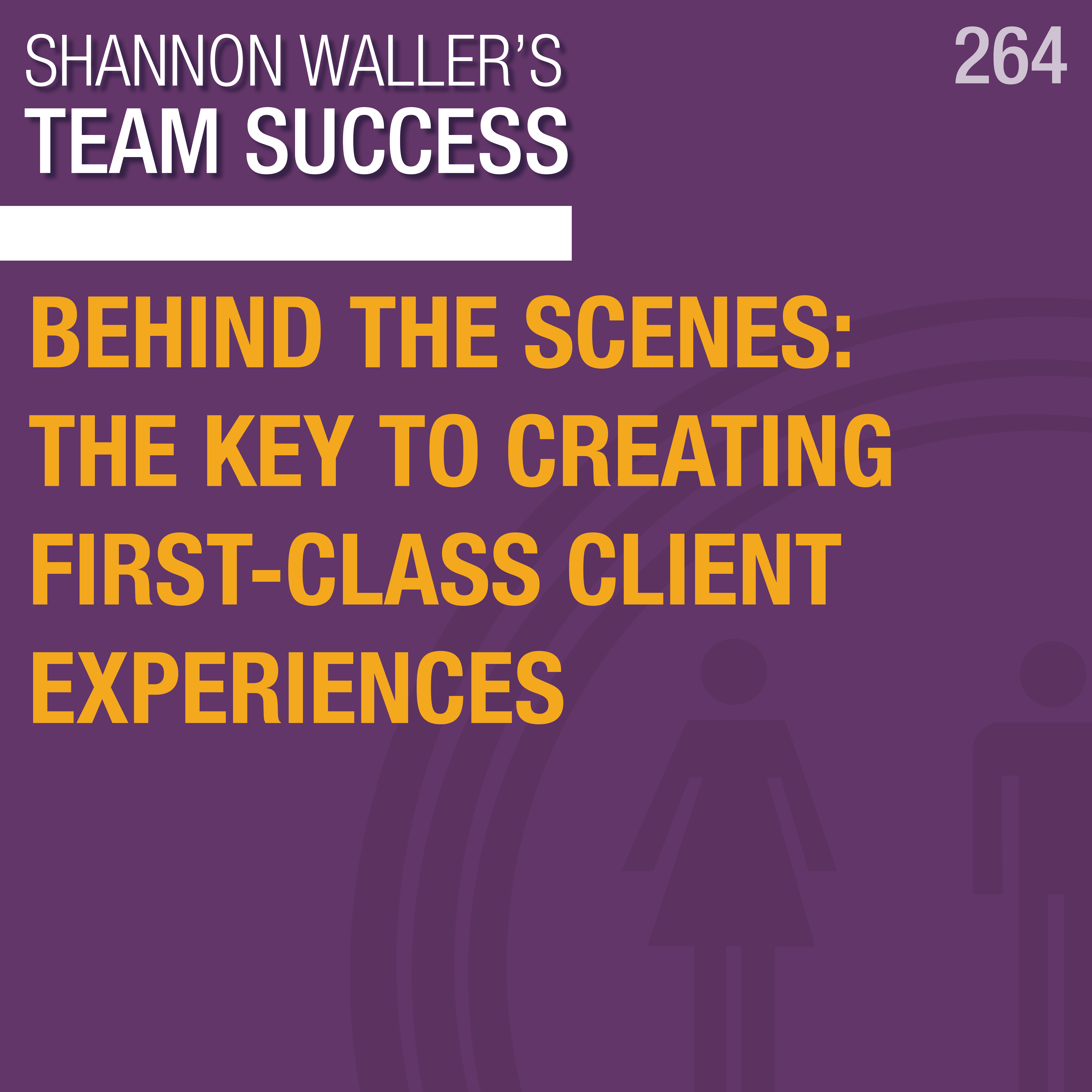
Before important client meetings, are you and your team running around handling last-minute logistics? How prepared does your team feel going into the meeting? In this episode, Shannon Waller discusses the value of bookending client meetings with clearings and debriefs to elevate the overall experience for clients and team members. Here’s the why and how of Strategic Coach’s backstage process that prepares the team for delivering exceptional front stage results.
Show Notes:
Clearings Before Meetings:
- Positive Focus®: Starting with the Positive Focus exercise allows everyone to:
- Feel energized and excited by reflecting on a recent win.
- Get present and shift their focus from past or future distractions.
- Preview of the day: Providing an overview of what to expect during the day:
- Helps everyone get familiar with the agenda, timing, and their roles.
- Focuses the team on key conversations or key points to make.
- Setting intentions: Everyone states what they want to be true at the end of the experience, thereby creating a shared vision they’re all aligned on.
Debriefs After Meetings:
- Reflection and sharing: Debriefs at the end of the day provide an opportunity for team members and clients to reflect on the experience, share insights, and discuss key takeaways.
- Continual improvement: By discussing what worked well, areas for improvement, and any insights gained, the team can continually enhance their performance and refine their approach for future meetings.
- Leaving on a positive note: As a final wrap-up, each person shares the value they got from the meeting.
Benefits Of Clearings And Debriefs:
- Being present: The team has greater engagement in, participation in, and ownership of a superb client experience.
- Centering the results for the client: By focusing on what will allow clients to leave feeling more confident and motivated, the team can stay responsive to delivering a more personalized and impactful experience.
- Psychological and emotional preparation: The team is alert and responsive to client needs, ready to expand and elevate the thinking in the room. Everyone is more confident, clear, and prepared to take action to achieve the agreed upon-result for the client.
- Transformational experience: When the team is focused on the clients, they have the opportunity to create unexpected value for them, elevating the interaction from a transactional experience to a transformational one.
Teams can incorporate clearings and debriefs with meetings, coaching sessions, workshops, or any other key client interactions to significantly enhance the overall experience for both clients and team members. At Strategic Coach®, we also have clearings and debriefs for internal team meetings so that we can continually improve our internal experience. Though the goal is to constantly improve client satisfaction, this always has to include elevating the experience for team members too.
Resources:
Article: “Your Business Is A Theater Production: Your Back Stage Shouldn’t Show On The Front Stage.”
Free tool kit download, including The Positive Focus®
18 April 2024, 1:40 pm - Positive Focus®: Starting with the Positive Focus exercise allows everyone to:
- 8 minutes 30 secondsThe Power Of Saying “Yes” To New Ideas

How would you like to learn a strategy for improving creativity, connection, and collaboration within your team that’s as simple as saying the word “yes”? In this episode, Shannon Waller explains how graciously saying yes to your team members’ ideas is an easy yet powerful way to foster deeper conversations and collective problem solving, and dives into the importance of cultivating a positive environment for idea sharing. With actionable techniques for leaders, entrepreneurs, and team members to harness the power of teamwork and practical ways to validate and engage with new ideas, this is one episode you won’t want to miss!
Show Notes:
- Finding aspects of an idea to say yes to can significantly increase collaboration and creativity within your team.
- Team productivity depends heavily on whether entrepreneurs can create a positive space for sharing ideas.
- To foster this kind of idea-sharing culture, it’s important to acknowledge and respect the mindset of individuals who are brave enough to come to you or their team leaders—people who stand higher above them in the company’s hierarchy whether it’s explicit or not—with their ideas.
- There are practical techniques you can use for engaging with and validating new ideas, all of which promote constructive dialogue and problem solving.
- Team collaboration only gets better when you seek out and engage with new ideas from individuals whose thinking profiles and striving instincts differ from your own.
- Graciously finding parts of an idea to support, rather than outright rejecting ideas that aren’t perfect in their entirety, can also lead to deeper conversations and more effective teamwork.
- You can create a more collaborative environment for discussion when you try to find common ground with whatever idea is being pitched to you.
Resources:
11 April 2024, 1:35 pm - 12 minutes 59 secondsThe Excellent Trap: The Danger Of Not Letting Go
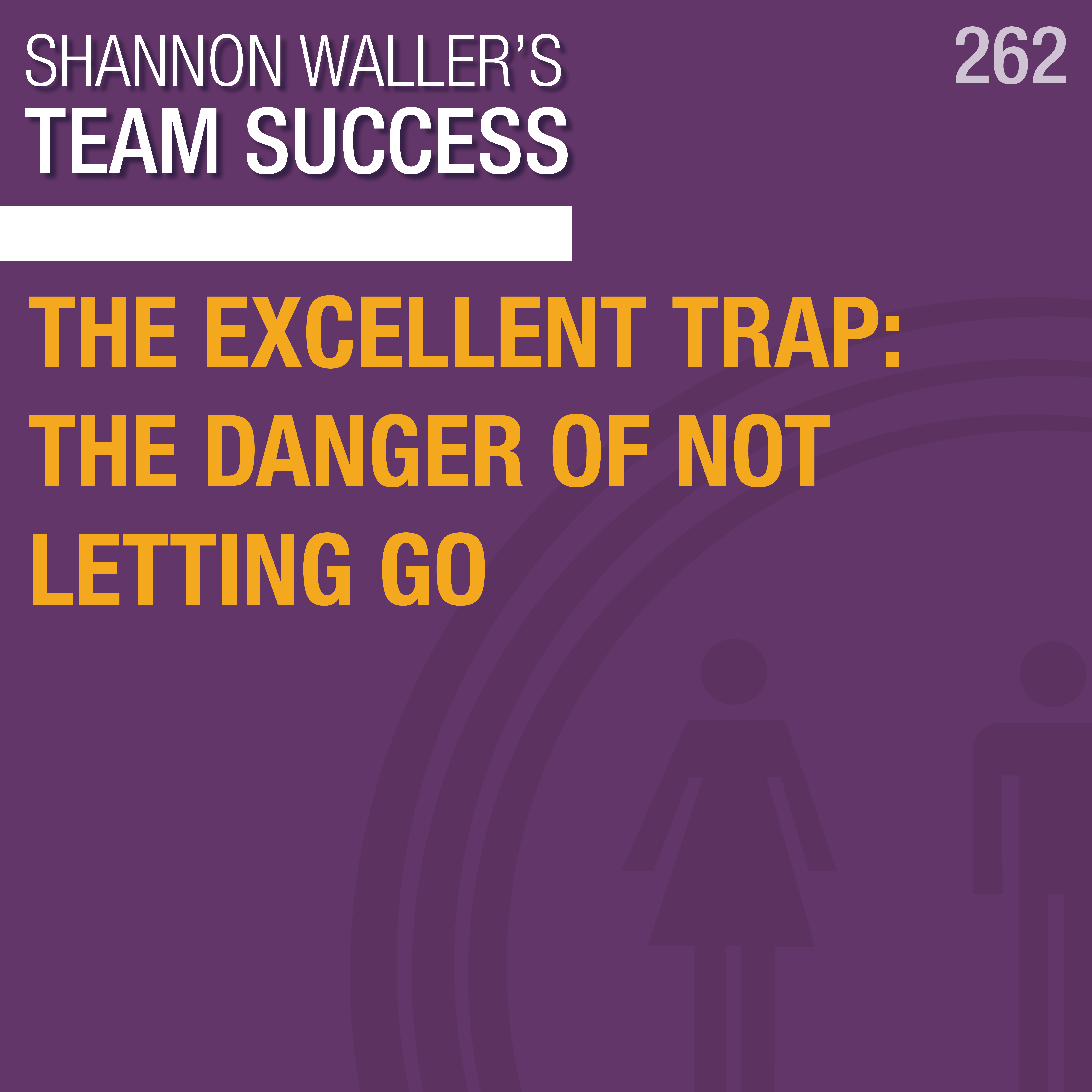
In this episode, Shannon Waller talks about the dangers of the “Excellent Trap.” Are there activities you have superior skills but no passion for? Are you bored with them but resisting having someone else take them on? Let Shannon convince you why you should let go of these “Excellent,” but not “Unique Ability,” activities. Shannon has useful advice on how to identify the activities, when it’s time to let them go, and who to hand them off to.
Show Notes
Signs To Look Out For:
- Loss of passion: If you find yourself going through the motions without the same level of excitement or interest as before, it could be a sign that you’ve outgrown the activity.
- Boredom and lack of challenge: Activities that were once stimulating may become routine and unchallenging over time, leading to lack of interest.
- Others who show skill and energy: Pay attention to people around you who show a keen interest in the tasks you excel at but no longer feel passionate about. These individuals may bring fresh ideas and creativity to the table.
Benefits Of Passing Off Tasks:
- New perspectives: Allowing someone else to take over tasks can bring in new perspectives and innovative approaches that you may not have considered.
- Freeing up time: By delegating tasks that no longer fire you up, you free up time to focus on activities that engage your creativity and align with and help you grow your Unique Ability®.
- Team growth: Passing off tasks can also contribute to the growth and development of your team members, providing them with opportunities to showcase their skills and creativity.
Steps To Take:
- Self-reflection: Identify Excellent activities where you have superior skill but lack passion. For comparison, also make a list of your Unique Ability activities, those you find endlessly fascinating and motivating. Pick one or two Excellent activities to let go of.
- Identifying potential candidates: Keep an eye out for individuals within your team or network who exhibit enthusiasm and creativity in the areas you are considering passing off.
- Initiating conversations: Approach potential candidates and discuss the possibility of them taking over the tasks. Observe their reactions and eagerness to explore these responsibilities.
- Transition planning: Once you find a suitable candidate, plan a smooth transition of responsibilities, ensuring that the handover is seamless and well-communicated.
Conclusion:
Recognizing when to pass off activities where you excel but lack passion is a crucial step toward personal growth and team development. By entrusting tasks to individuals with a fresh perspective and enthusiasm, you not only free yourself from mundane (to you!) responsibilities but also foster a culture of collaboration and growth within your team. Embracing this mindset of delegation and empowerment can lead to enhanced creativity, efficiency, and overall success in both personal and professional endeavors.
Resources:
Unique Ability® 2.0: Discovery by Catherine Nomura, Julia Waller, and Shannon Waller
The Road Less Stupid by Keith Cunningham EOS®: Entrepreneurial Operating System®
Questions for Shannon: [email protected]
21 March 2024, 1:39 pm - 1 hour 1 minuteDaring To Build An Intentional Culture, with Mark O’Donnell, Kelly Knight, and CJ DuBe’

Looking for ways to improve your team’s performance and create a positive work environment? In this episode of the Team Success podcast, host Shannon Waller interviews entrepreneurs Mark O’Donnell, Kelly Knight, and CJ DuBe’ about their new book, People: Dare to Build an Intentional Culture, which focuses on the importance of creating an intentional culture within organizations and how it impacts the success of a business. They delve into topics such as the difference between accidental and intentional cultures, the concept of “right people, right seats,” and the mindset required for leaders to build and maintain a thriving culture. If you’re looking to transform your organization and create a culture that attracts and retains top talent, this episode is a must-listen.
Show Notes
- Building an intentional culture requires courage and boldness. It’s not an easy task, but it is essential for the success and growth of any organization.
- By being intentional about the values, behaviors, and mindsets that shape your culture, you can create a workplace that attracts and retains top talent, fosters collaboration, and drives long-term success.
- The concept of “right people, right seats” is crucial for building a high-performing team. It involves finding individuals who align with your core values and possess the skills and capacity to excel in their roles.
- It’s also about surrounding oneself with like-minded individuals who align with the company’s mission and purpose. This ensures that everyone is working toward a common goal and contributes to a positive and productive work environment.
- By ensuring that each team member is in the right seat, you can maximize productivity, minimize conflicts, and create a harmonious work environment.
- Genuine care and concern for your team members is a powerful force that can transform your business. When leaders prioritize the well-being and growth of their team members, it creates a culture of trust, loyalty, and engagement.
- The accountability chart is a powerful tool that helps you define the structure of your business and ensure that each individual is in the right seat. It goes beyond the traditional organizational chart by focusing on accountability and aligning roles with core values.
- Regularly reviewing and adjusting the accountability chart is essential to maintaining a healthy and high-performing culture.
- Building an intentional culture requires courage and focus. It involves being deliberate in hiring individuals who align with the company’s values and ensuring they’re in roles where they can thrive.
- Leaders must also have a growth mindset and be willing to have honest conversations to address any issues and support the development of their team members.
- It’s essential for leaders and managers to provide feedback, address performance issues, and make necessary changes to ensure that team members are in roles where they can thrive and contribute to the company’s success.
- When you empower teams with a shared purpose and passion, you create an environment where team members not only feel valued, but motivated and excited to contribute meaningfully to the success of your company.
Links
EOS®: The Entrepreneurial Operating System®
The Team Success Handbook by Shannon Waller
7 March 2024, 2:12 pm - 14 minutes 12 secondsHow To Manage Micromanagement

Ever been micromanaged? Doesn’t feel great, right? And it’s easy to react emotionally to it. But why is your entrepreneur or team leader micromanaging? It’s likely not because they don’t trust you. In this episode of Team Success, host Shannon Waller breaks down why leaders micromanage, then coaches team members through an effective strategy to solve the problem. She also has tips for managers to unlock the source of the anxiety that is leading to their micromanaging their teams.
Show Notes:
- Failing to address micromanagement can lead to a lot of distraction and a lack of focus on results.
- Micromanagement is not always about not trusting team members with their responsibilities.
- Micromanaging is often a response to an emotion the micromanager hasn’t fully explored yet.
- Shannon recommends the team member who is feeling micromanaged start a conversation with the micromanager to ask about the bigger picture, including what the best-case and worst-case scenarios look like to them.
- Both parties can work through The Strategy Circle® thinking tool together so everyone is clear on not just the end goal but how each obstacle will be tackled.
- Confidence can be further established by reporting progress at regular and frequent times.
- If you find yourself becoming a micromanager, examine your own worries and fears.
- Identify the best- and worst-case scenarios to gain clarity on your anxieties.
- Communicate your concerns transparently to your team to foster trust and support.
- Self-awareness and understanding others’ perspectives are crucial in addressing micromanagement issues.
- Addressing micromanagement improves communication, collaboration, trust, and overall productivity.
Resources:
Your Life As A Strategy Circle by Dan Sullivan The Team Success Handbook by Shannon Waller A Beginner’s Guide To Unique Ability23 February 2024, 3:48 pm - 1 hour 26 secondsA Conversation With Kathy Kolbe: Conative Intelligence & The Importance of Caring First
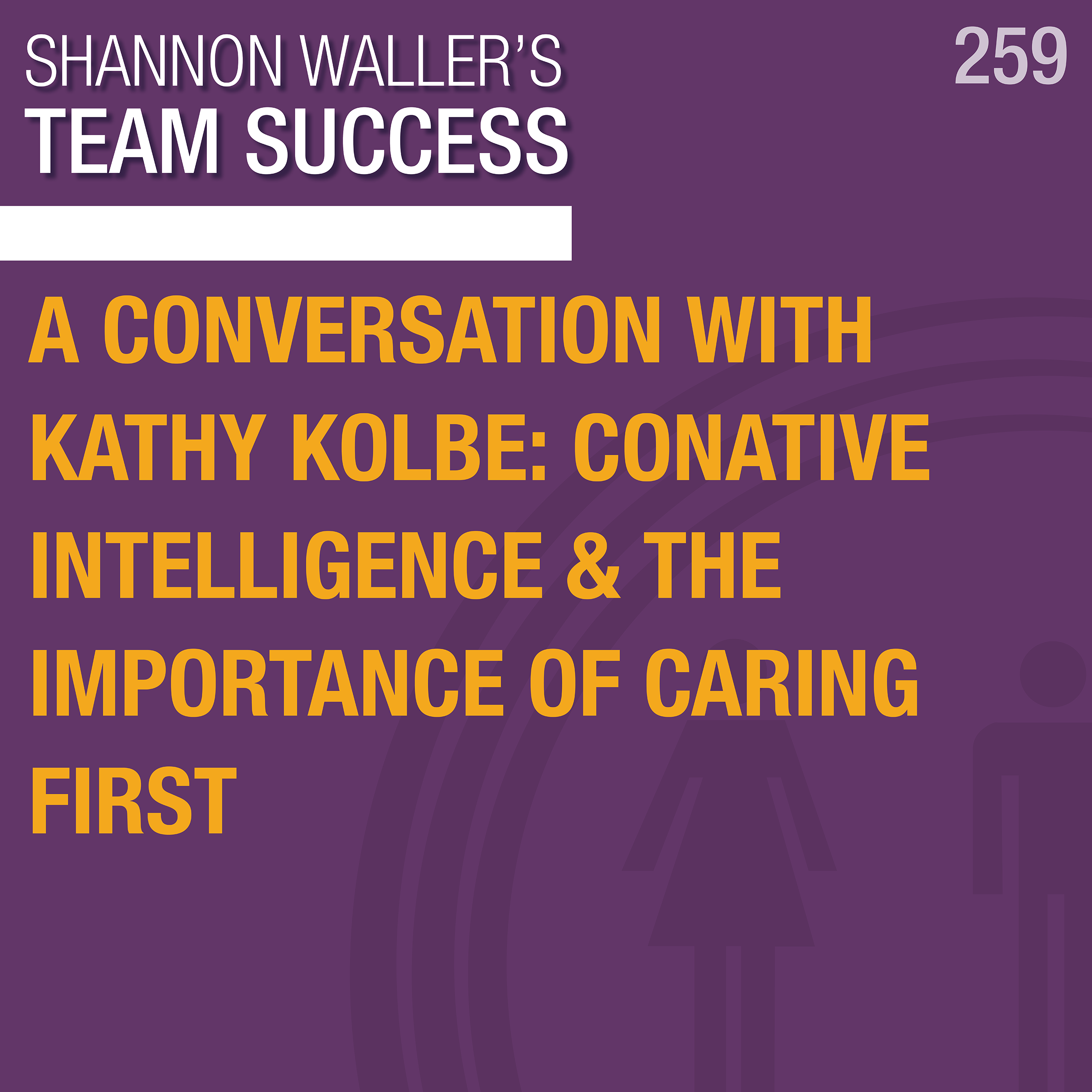
Do you know what makes a good leader? The answer might surprise you! In this episode of the Team Success podcast, renowned thought leader Kathy Kolbe, founder of the Kolbe Index, joins Shannon Waller to delve into the realm of conative intelligence. The pair explore the impact of emotional leadership, the limitations of cognitive intelligence, and the power of understanding one’s Kolbe MO, along with how embracing conation can drive entrepreneurial success. With valuable insights and real-life examples (plus an inside look into Kathy’s inspiring life and business journey), this episode provides actionable strategies for any entrepreneur looking to harness conative intelligence, foster effective teamwork, and elevate their leadership approach.
Show Notes:
- To make more confident entrepreneurial decisions and refine your leadership approach, it’s essential that you leverage your natural conative intelligence.
- Similarly, when you understand the conative differences within your team, you can leverage individual strengths more effectively.
- If you want to foster commitment and drive success in your company, you must get emotional buy-in. When people are emotionally engaged in a project, they produce better, more creative work, and they do it faster too.
- A great way to do this is to connect individual goals and personal priorities with team objectives. This is emotional leadership.
- You can practice emotional leadership by showing genuine care and understanding for your team’s affective priorities. In other words, foster an environment where team members are aligned with their personal goals.
- Cognitive intelligence only gets you so far. If you’re constantly fighting your Kolbe MO, everything you do will feel difficult—and not very fun.
- You can empower your team’s creativity and problem-solving abilities by identifying and utilizing individual conative strengths effectively.
- The worst thing you can do is assemble of team of people with the same conative strengths. Success happens when you put different strengths together.
- A good leader should prioritize open discussions about conative differences and their impact on creativity, leadership, and teamwork within your organization.
Resources:
The Kolbe A™ Index8 February 2024, 2:04 pm - 19 minutes 2 secondsA Goal-Setting Team Is A Self-Managing Team
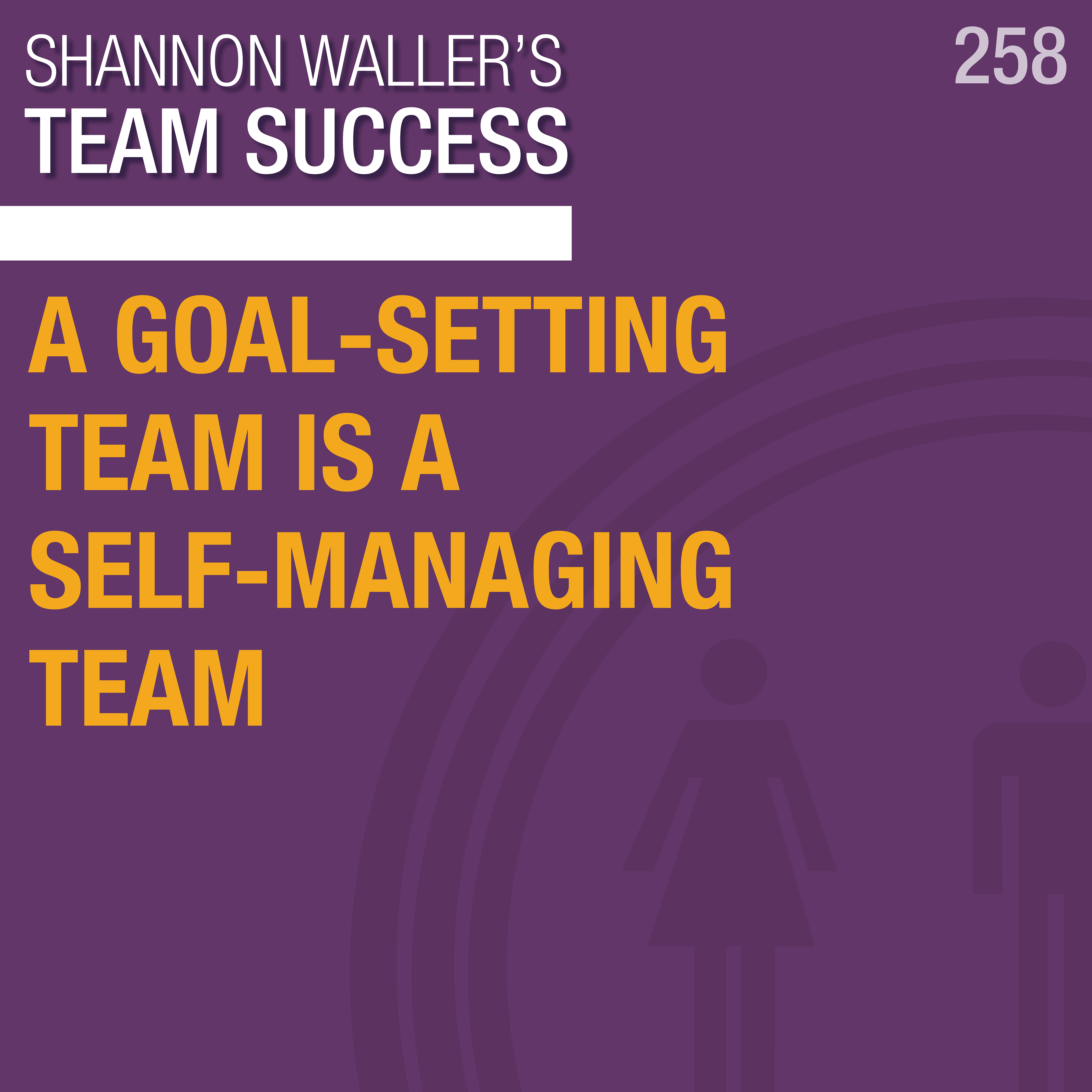
Are your team members growth oriented? How do you foster that mindset in your company? Today, Shannon Waller breaks down the January Strategic Coach® team meeting in which each of the 100+ team members thought through their personal growth and contributions for the upcoming year. How did it work, and how does that investment translate to the success of the business?
Show Notes:
Motivated For Growth
- The ROI for investing in your team’s personal and professional goals is team members becoming self-managing and growth-oriented.
- For the kick-off meeting of the year, the 100+ team members at Strategic Coach spent three hours thinking about their values, their intentions for the year, and their areas of growth.
- The meeting began with asking everyone to share their intentions for the year based on their values and PRINT® motivations.
Celebrating The Previous Year’s Achievements And Progress
- Next, the team walked through The Positive Focus® exercise to reflect on achievements and progress from the past year.
- Everyone was asked to write down three business achievements and two personal achievements from the previous year.
- For each achievement, they wrote its significance and why they viewed it as progress.
- Then, they considered what further progress they could make on those achievements and what their first action would be.
- In small breakout groups, they then shared one or two of their achievements, allowing for 20 minutes of celebration and connection.
Connecting Past To Future
- Next, Strategic Coach founder and lead coach Dan Sullivan led the team through the Triple Play™ exercise, which involves reflecting on and finding connections between three past accomplishments or experiences.
- The insights Shannon gained through this exercise gave great clarity to her 2024 intentions, distilling the lessons of the past year into ideas for a bigger future.
Creating A Bigger Future
- One of Strategic Coach’s favorite mantras is, “Always make your future bigger than your past.”
- Strategic Coach co-founder and CEO, Babs Smith, shared the 10-year vision and three-year vision for the company.
- This set the stage for an exercise called The Bigger Future™, which helps make ambitious long-term plans more concrete.
- This exercise has people envision their six-year ambitions, then work back to the three-year capabilities they’ll need to develop, and then the one-year challenges that will move them toward those.
Expanding Capabilities Expands Positive Impact
- Expanding individual capabilities expands the positive impact of each team member’s Unique Ability®, which creates a growth path for a Unique Ability organization.
- Encourage team members to pursue self-directed growth rather than having growth paths dictated to them.
- Give them ownership over their development goals but provide them with the capabilities to achieve them.
- Look for job candidates who are self-motivated learners who bring their own drive and initiative.
Benefits Of Investing In Team Member Growth
- By investing in team members’ personal and professional growth, leaders can gain their gratitude, develop more capable teams, and create loyalty within the organization.
- This can result in lower team member turnover and higher retention of high-performing individuals.
- Even if team members do leave after being supported, they may become raving fans who recommend the company.
Resources:
The Positive Focus The Gap And The Gain by Dan Sullivan with Dr. Benjamin Hardy The Self-Managing Company by Dan Sullivan Unique Ability Unique Ability Teamwork Wanting What You Want by Dan Sullivan EOS®: Entrepreneurial Operating System PRINT: Team Success Podcast, episode 224, “Uncovering ‘The Why Of You,’ With Debra Levine” Deirdre Van Nest of Crazy Good Talks25 January 2024, 12:53 pm - 9 minutes 15 secondsFrom Boasting To Celebrating: How To Shift Your Mindset For Success
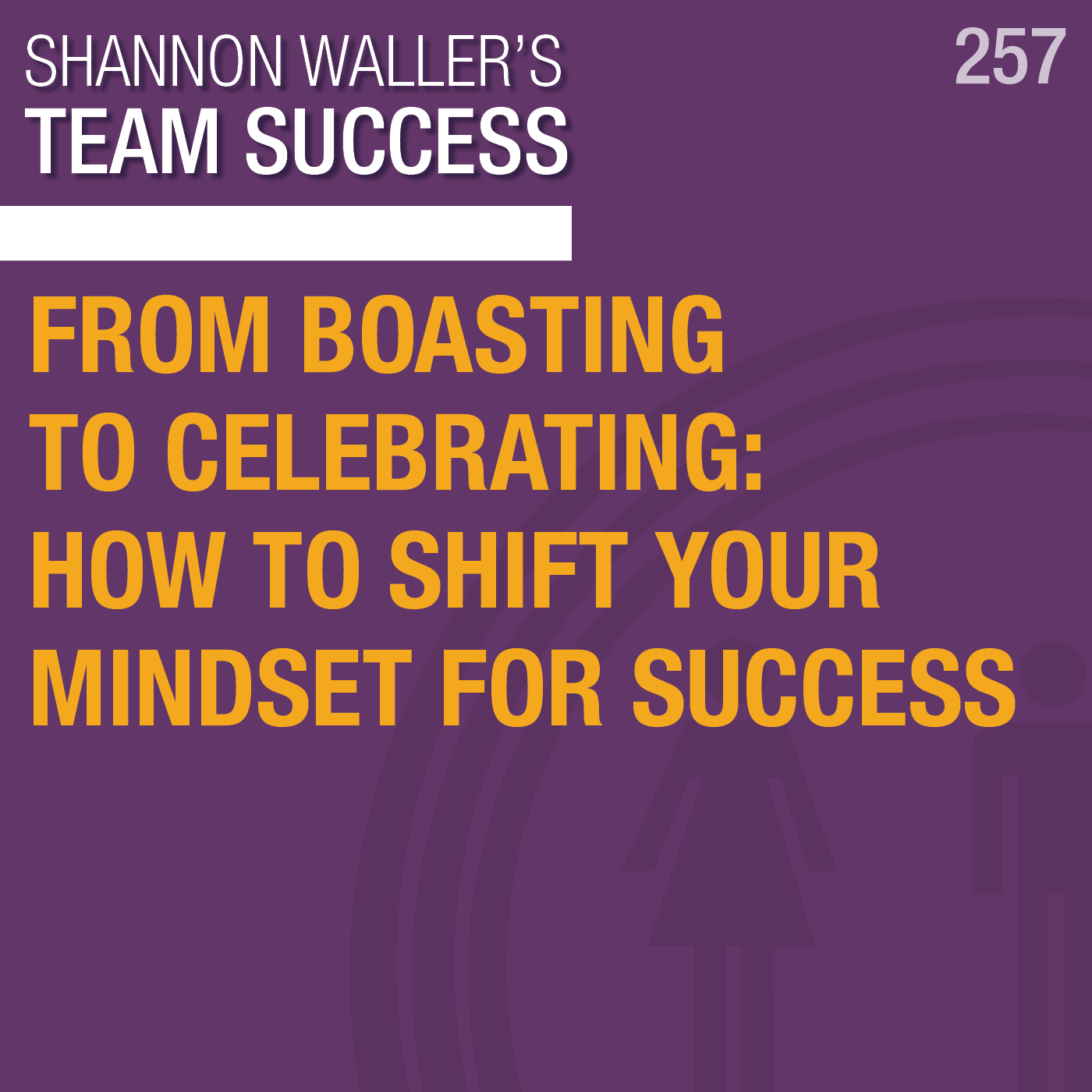
Have you ever wondered how to transform your experiences into opportunities for future growth? Discover the power of celebrating wins in this episode of the Team Success podcast. Join Shannon Waller as she delves into the important difference between boasting and celebrating achievements and learn how sharing wins with team members not only fosters a positive company culture and supports individual growth, but also provides valuable opportunities for strategic reflection. She also shares practical tips for creating a celebratory environment and leveraging small wins to achieve big business goals. For any entrepreneur seeking to cultivate a supportive, growth-oriented atmosphere while driving sustained business success—this episode is for you!
Show Notes:
- Encourage a work environment where team members feel comfortable sharing their wins and accomplishments to create a positive and supportive workplace culture.
- You can also seek out communities or mentorship programs that celebrate your successes and provide constructive feedback rather than criticism.
- Celebrating wins is not just about acknowledgment; it’s also an opportunity to analyze successful strategies and implement them for future endeavors.
- As a business leader, you can foster a culture of mutual recognition and support by celebrating team wins and encouraging your team to do the same for each other.
- To create a motivated and enthusiastic work environment, start every meeting with a Positive Focus®, allowing team members to share their achievements and exciting developments.
- Advocate for taking manageable steps toward business goals to gradually build momentum and sustain progress without causing overwhelming fear or resistance to change.
- Integrate the concept of celebrating personal and professional accomplishments into the company culture, similar to how close-knit family members might share and support one another’s achievements.
- Tracking your company’s achievements and progress is a great way to keep team members motivated and show how small wins lead to big results over time.
Resources:
One Small Step Can Change Your Life by Dr. Robert Maurer
19 December 2023, 9:03 pm - 11 minutes 50 secondsManaging Up, Part II
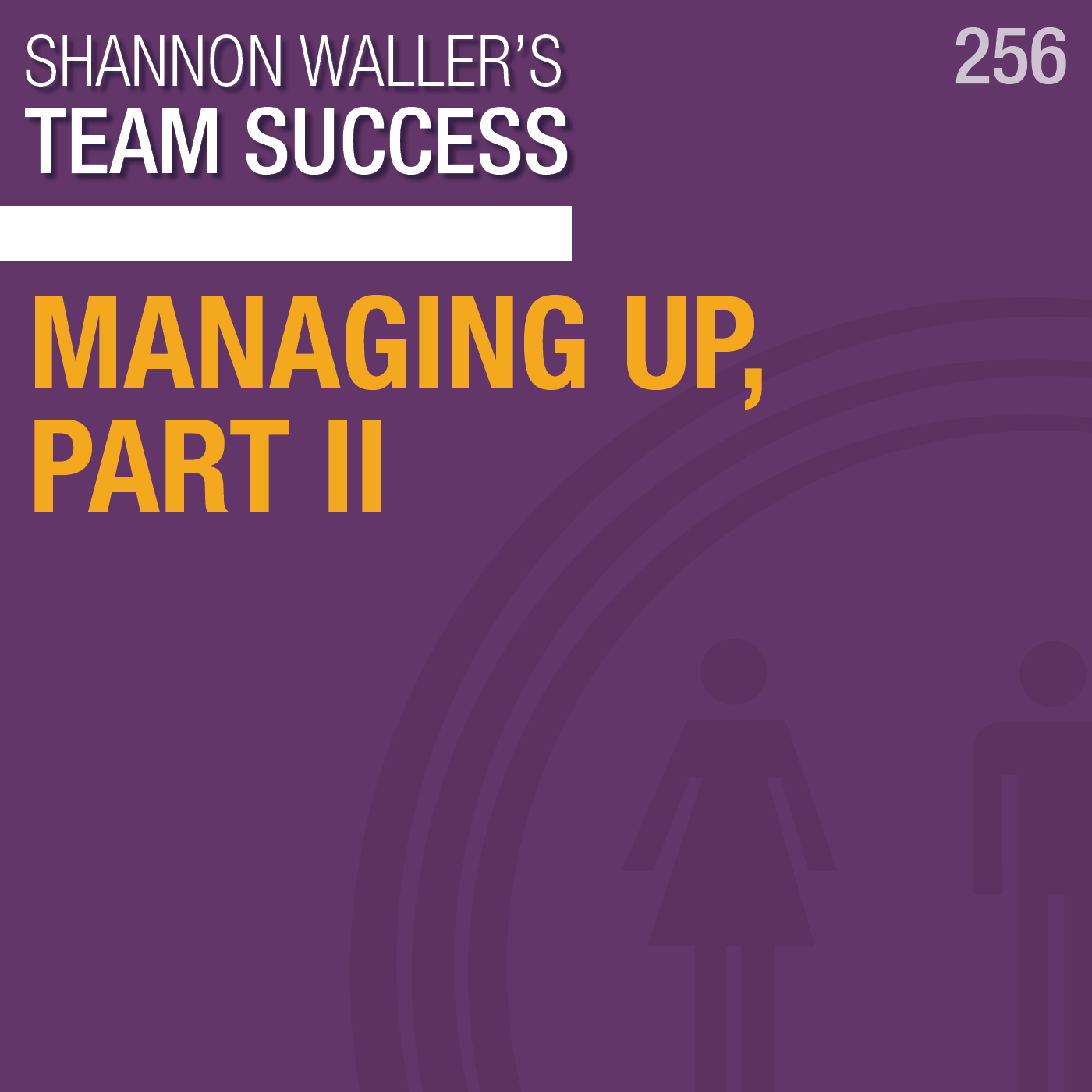
Join team success expert Shannon Waller as she dives into the art of supporting your entrepreneur. Are you seeing through their lens, anticipating their needs, and proactively contributing to the owner’s vision? Learn the power of a simple four-word question that will have your entrepreneur celebrating you. And, find out entrepreneur and coach Dan Sullivan’s ultimate compliment to a team member.
Show Notes:
“Managing up” means:
- You’re looking out for your entrepreneur.
- Taking a leadership perspective, which is the wider view, not only focused on the tasks in front of them.
- Knowing your entrepreneur’s long-term vision for themselves, for your team, and for the company.
- Getting feedback and having strategic conversations.
- Having a helper mindset: “How can I help?”
- Communicating your needs—technology, training, resources—to be much faster, make things easier, and achieve a bigger result.
- Your entrepreneur can say, “I never think about you”—because you take ownership, and they never have to worry about you.
- Assuming positive intent and digging deeper to understand the logic of strategies you disagree with. Use The Strategy Circle® thinking tool to help see the goal and obstacles and suggest alternative strategies.
- Speaking up when you see potential train wrecks; yes, it is your place to say something when you see something others don’t.
Resources:
Your Life As A Strategy Circle by Dan Sullivan
14 December 2023, 11:51 am - 7 minutes 1 secondProving Yourself: The Surprising Barrier to Effective Teamwork
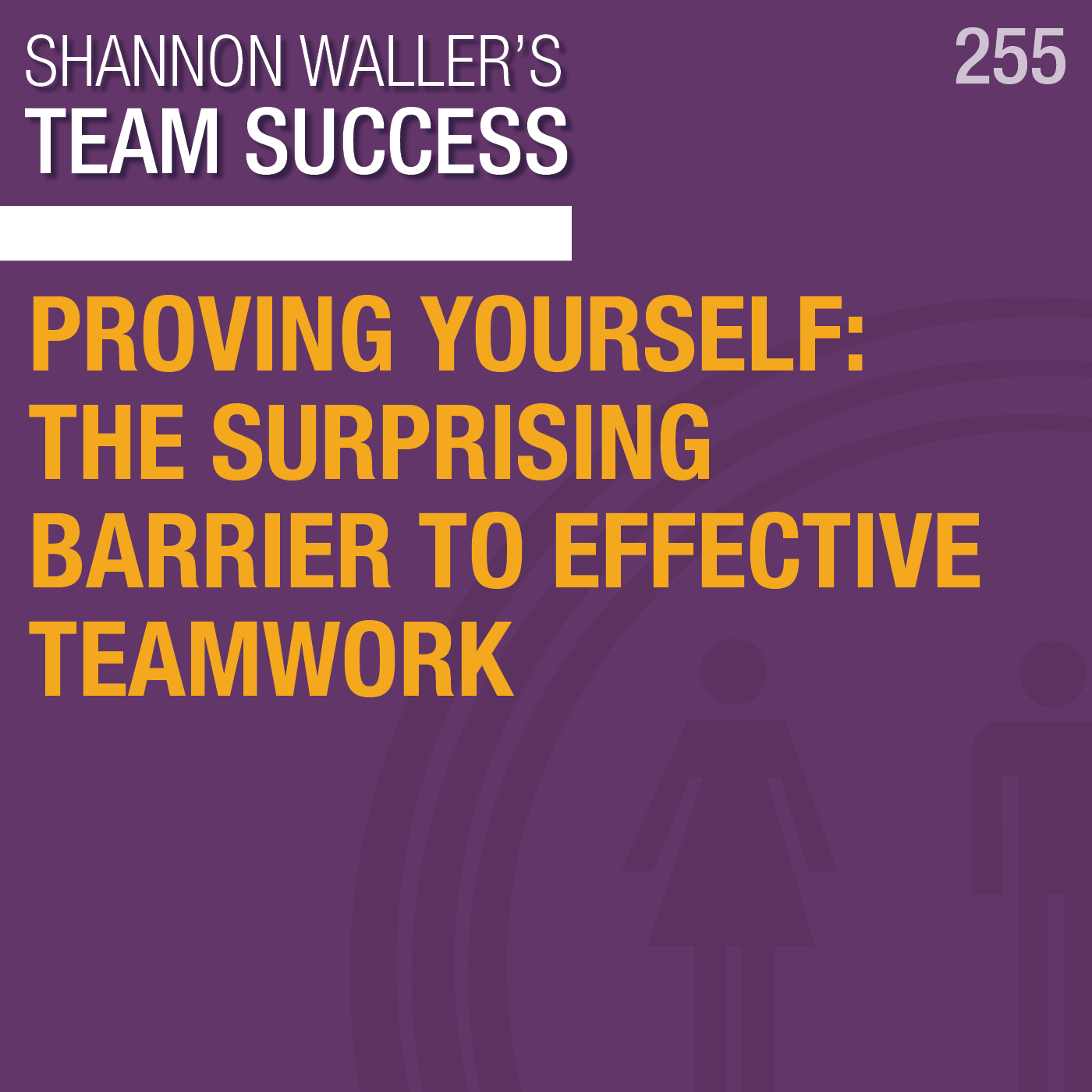
Ever felt the pressure to prove yourself in a new role or venture? Join Shannon Waller in the latest episode of The Team Success Podcast as she uncovers the hidden downsides of the “proving game” in business. Through a revealing coaching dialogue, Shannon explores the impact of seeking validation and highlights the unexpected barriers it presents to effective teamwork. Discover actionable insights and strategies that empower entrepreneurs to cultivate genuine success and authentic leadership within their teams. If you’re ready to challenge conventional thinking and unleash the true potential of your business, this episode is a must-listen!
Show Notes:
- Most people feel like they need to prove themselves when starting a new role, and that’s okay. Just be mindful of how that may impact your ability to work with a team.
- One strategy? Avoid making everything about yourself. Stay open to feedback by focusing on others and reflecting on your progress.
- You can also build quiet confidence by seeking validation less and focusing on others more.
- Strive to be calm and confident, as these qualities broaden your perspective and enable creativity. When you’re stressed, your focus narrows.
- Understand how fears of failure or job security can hinder creativity and teamwork.
- Recognize that being new doesn’t mean you immediately need to prove your worth to everyone. Focusing too much on yourself impedes the learning and growth that are essential to thriving in a new role.
- If you notice someone eager to prove themselves in a new role, have open and positive discussions with them without a specific agenda.
- Encourage team members to be confident (while avoiding arrogance). This promotes a calm and creative environment for teamwork.
- To avoid frustration, focus on tracking your success and recognizing your achievements.
Resources:
29 November 2023, 9:24 pm - 52 minutes 17 secondsTeamwork Triad In Real Life, with Chad Willardson

In previous episodes, Shannon has talked about the Teamwork Triad—are you curious to see how it plays out in real life? In this episode, Shannon interviews entrepreneur, author, and podcast host Chad Willardson about his Unique Ability® Dream Team. Learn how to find extraordinary executive assistants who not only support you, but sit in the Teamwork Triad seats that will help you achieve 10x growth.
Show Notes:
- Chad Willardson is an entrepreneur, author, and podcaster from Southern California. He left Merrill Lynch in 2011 to start his own company, Pacific Capital, a wealth management firm serving entrepreneurs.
- Teamwork specialist Shannon Waller and Unique Ability specialist Julia Waller introduced the idea of a Unique Ability “Dream Team” to support Chad beyond his business. This team, called the Teamwork Triad, includes a Visionary, an Innovation Manager, and a Focus Manager.
- Chad found two extraordinary people he knew would be the right fit through LinkedIn.
- Maddie was hired to be Chad’s Strategic EA and handles business-related tasks. Chad calls her his left brain.
- Oriya was hired to be Chad’s Operational EA and focuses on personal tasks, marketing, travel planning, and calendar management. Because of her interests and skills in design, Chad calls her his right brain.
- What each member of the triad is responsible for can be summed up by “make it up” (Chad, the Visionary), “make it real” (Maddie, the Innovation Manager), and “make it recur” (Oriya, the Focus Manager).
- Chad’s main requirement was to find and hire high-caliber individuals who align with his vision and have the mental horsepower to handle complex tasks.
- The team uses tools like Asana, Microsoft Teams, and Google Docs for communication and task management.
- Regular communication and collaboration are keys to success for a team that works mainly remotely but meets bi-weekly in person. The team meets weekly and has in-person collaboration sessions every other week to align on goals and projects.
- The trust and empowerment Chad gives his team leads to his own increased freedom and success as an entrepreneur.
- Chad used assessments like Kolbe, CliftonStrengths®, PRINT®, and Working Genius to understand each of their strengths and how to best work together.
- Chad asked ChatGPT to assess potential clashes given everyone’s assessments, gave its response to Maddie and Oriya, and had them discuss how they would avoid territorial dangers.
- From the beginning, Maddie and Oriya forged their friendship and working relationship based on mutual respect for each other’s separate interests and areas of Unique Ability.
- Because of how Chad has empowered them, Maddie and Oriya find ways to help each other without having to get Chad involved, thereby keeping his capacity free for his own Unique Ability projects.
- Maddie and Oriya have been attending their own workshops with Strategic Coach® to learn how to use tools such as The Weekly Planner and The Impact Filter™, which further simplify communication and delegation for all three.
- Maddie and Oriya have collected their tips on how entrepreneurs can most effectively work with two executive assistants: “EA Collaboration Guide.”
- Freed up from daily business operations, Chad is leveraged to think about bigger opportunities beyond his business, such as Free Zone collaborations with other 10x entrepreneurs.
Resources:
Books:
- Stress-Free Money: Overcome These Seven Obstacles to Find Financial Freedom
- Smart, Not Spoiled: The 7 Money Skills Kids Must Master Before Leaving the Nest
- Fit for Wealth: 7 Breakthrough Strategies for Elite Health and Abundant Wealth
Podcasts:
Financial learning app for kids: GravyStack
EA Collaboration Guide:
Personal assessments:
- CliftonStrengths website
- Kolbe
- PRINT: Team Success Podcast, episode 224, “Uncovering “The Why Of You,” With Debra Levine”
- Wonderlic
- Working Genius
Productivity:
Other resources:
- EOS: Entrepreneurial Operating System
- Tribal Leadership: Leveraging Natural Groups to Build a Thriving Organization, by Dave Logan, John King, Halee Fischer-Wright
Strategic Coach concepts, tools, and books:
- The Strategic Coach® Program
- Free Guide to The Entrepreneurial Time System® PDF download: “The Entrepreneur’s Guide To Time Management”
- Free Impact Filter worksheet PDF download
- The Team Success Handbook by Shannon Waller
- Unique Ability Teamwork article: “What Are Unique Ability Teams?”
- Who Not How: The Formula to Achieve Bigger Goals Through Accelerating Teamwork by Dan Sullivan with Dr. Benjamin Hardy
16 November 2023, 12:49 pm - More Episodes? Get the App
Your feedback is valuable to us. Should you encounter any bugs, glitches, lack of functionality or other problems, please email us on [email protected] or join Moon.FM Telegram Group where you can talk directly to the dev team who are happy to answer any queries.
 Exponential Wisdom
Exponential Wisdom
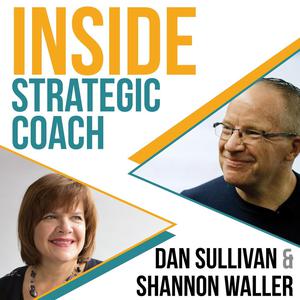 Inside Strategic Coach: Connecting Entrepreneurs With What Really Matters
Inside Strategic Coach: Connecting Entrepreneurs With What Really Matters
 Game Changer Jumps
Game Changer Jumps
 Podcast Payoffs
Podcast Payoffs
 I Love Marketing
I Love Marketing
 Multiplier Mindset® with Dan Sullivan
Multiplier Mindset® with Dan Sullivan